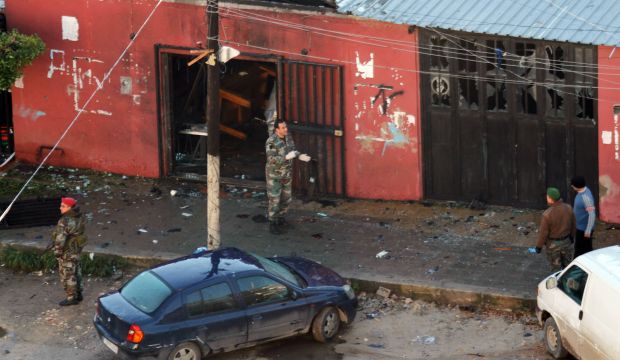
Lebanese Army soldiers inspect a cafe where a suicide bomb attack took place in Jabal Mohsen, Tripoli, on January 11, 2015. (REUTERS/Omar Ibrahim)
The Al-Nusra Front, Al-Qaeda’s official affiliate in the Syrian civil war, said it carried out the double suicide attack in the predominantly Alawite district of Jabal Mohsen “in revenge for the Sunnis in Syria and Lebanon.” The statement appeared on a Twitter feed operated by the group’s media arm.
Lebanon’s National News Agency gave the names of two suicide attackers it said were from Tripoli, an overwhelmingly Sunni Muslim city whose long-standing sectarian tensions have been exacerbated by the Syrian civil war.
Lebanon’s Health Ministry said the attack killed seven people. Other officials put the death toll at nine. Three dozen people were wounded.
Prime Minister Tammam Salam said in a statement the attack was “a new attempt to spread the seeds of strife” in Tripoli and would not “weaken the determination of the state and its decision to confront terrorism and terrorists.”
The army said the attack was carried out by a lone suicide bomber, though its investigations were still underway. The National News Agency said the second bomber had blown himself up as people gathered in response to the first blast.
Lebanon’s security has been repeatedly jolted by the Syria crisis, which has also helped paralyze its government: the country has been without a head of state since May.
Tripoli, Lebanon’s second biggest city, has historically been a bastion for Sunni Islamist groups, making it a concern for Lebanese security agencies that have warned of plans by the Islamic State of Iraq and Syria (ISIS) and the Al-Nusra Front to destabilize the country.
Militants linked to ISIS and Al-Nusra mounted an attack on the Lebanese border town of Arsal last August. They are still holding around two dozen members of the security forces taken captive in that incursion.
The last major flare-up in Tripoli was in October, when at least 11 soldiers and 22 militants were killed in fighting between Sunni Islamists and the army.
The targeted cafe was on a street dividing Jabal Mohsen from the Sunni district of Bab Al-Tabbaneh, which has often turned into a front-line for conflict between Sunni and Alawite communities over the years, particularly since Syria’s civil war erupted—pitting the government of President Bashar Al-Assad, an Alawite, against an insurgency dominated by Sunni Islamists. Its communal tensions were eased by a security plan brought into force last year.
Leaders from across Lebanon’s political divide called for unity. The powerful Shi’ite group Hezbollah, which is fighting alongside the government in Syria, responded to the attack by saying terrorist groups must be isolated.
It urged the people of Jabal Mohsen, whose Alawite sect is an offshoot of Shi’ite Islam, not to “be dragged towards reactions that would achieve the criminals’ vile aims.”
Former prime minister Saad Al-Hariri, an influential Lebanese Sunni politician backed by Saudi Arabia, said the attack aimed to fuel discord in Tripoli.
